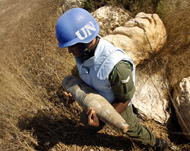Lebanon aid pledges top $940m
International donors have pledged more than $940 million for the reconstruction of Lebanon, nearly double the amount originally sought.

Fuad Siniora, the Lebanese prime minister, expressed his “great appreciation” to the donor countries meeting in Stockholm, Sweden.
He added that the conference had been successful “not just in terms of show of support of solidarity… but also in the pledges that have been made that show the Lebanese people are not alone”.
In a report to the conference earlier on Thursday, the Lebanese government had said at least $540 million was needed to help the country recover from the month-long fighting between Israel and Hezbollah guerrillas.
Jan Eliasson, the Swedish foreign minister, dismissed suggestions that the aid money would trickle down to Hezbollah, the Shia militia group, and strengthen its position in southern Lebanon.
“I don’t accept that argument,” Eliasson said before the meeting. “This conference aims at strengthening the central government of Lebanon and in that government Hezbollah is only a minor part.”
Housing the displaced
 |
| Much of southern Lebanon remains littered with unexploded ordnance |
The war, which ended after a UN-brokered ceasefire on August 14, has left large sections of southern Lebanon and whole neighbourhoods south of Beirut in ruins.
An estimated one million people fled their homes during the fighting while 1,100 Lebanese and more than 150 Israelis also died.
The Lebanese government, along with the UN Development Programme, has identified a list of early recovery efforts, including finding housing for displaced families, rebuilding the local infrastructure, improving social services and clearing unexploded ordnance.
Some research has estimated that up to 70 per cent of Israeli bombs failed to explode.
The Lebanese report said more than 50 people had been killed by such munitions after the ceasefire and that more than 4,000 pieces of unexploded ordnance had been destroyed.
Fighting started on July 12 after fighters from Hezbollah crossed the Israeli-Lebanon border at Aita al-Shaab, killed three Israeli soldiers and seized two others.